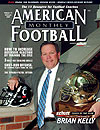AMERICAN FOOTBALL MONTHLY THE #1 RESOURCE FOR FOOTBALL COACHES
|
|
Article Categories
|
Schutt - College Coaches of the Year© More from this issueMike London
University of Richmond
Creating Competition in Practice – Making Players Perform Under Pressure
After seven games into the 2008 season with a record of 4-3, nobody believed Richmond could win it all, except Mike London himself, who saw something special in his guys. “I knew that our losses could have gone either way early on,” said London, who was the defensive coordinator at Virginia before taking the job at his alma mater. “We lost to a Virginia team who knocked off two ranked teams in North Carolina and Maryland. We lost to a Villanova team who I thought was one of the better teams in the county. And we lost to James Madison, a perennial powerhouse, in the final seconds of the game. So I knew that if I kept these kids positive things would work out.”The full article can only be seen by subscribers.
Subscribe today!

|
|
|
NOT A SUBSCRIBER?
Subscribe
now to start receiving our monthly magazine PLUS get INSTANT
unlimited access to over 4000 pages of 100 percent football coaching
information, ONLY available at AmericanFootballMonthly.com!
|
|
|
HOME
|
MAGAZINE
|
SUBSCRIBE
|
ONLINE COLUMNISTS
|
COACHING VIDEOS
|
Copyright 2025, AmericanFootballMonthly.com
All Rights Reserved






